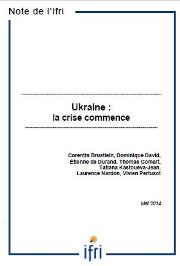Security - Defense
As a result of global strategic competition, security and defense issues are marked by the return of major wars and nuclear deterrence, the transformation of terrorism and the race for military technologies.
Related Subjects

Ukraine : the crisis begins
Il y aura un avant et un après. En Ukraine, en Russie, dans toute l’Europe, ailleurs.
La disparition de l’Ukraine comme entité souveraine – on en est plus près que jamais – serait un coup de tonnerre en Europe. Parce que l’espace qui lui survivrait serait très difficilement gérable, ouvrant le risque d’une longue guerre civile dans le style Balkans- années 1990. Et parce que la Russie est incapable de gérer seule cet espace où les Occidentaux n’ont guère l’envie de s’investir profondément.
Une Europe aux abonnés quasi-absents. La crise prend à contre-pied une Politique européenne de voisinage (PEV) brouil- lonne, éclaire l’impuissance militaire de l’Union de Lisbonne et son incapacité à s’entendre sur une stratégie commune face à un pro- blème fondamental dans son voisinage, tant demeurent prégnants les intérêts nationaux, et non politiques les mécanismes bruxellois.
Et loin, très loin, l’Amérique... Une Amérique finalement assez peu présente dans la crise, mais qui se voit, en un temps d’incertitude sur son propre positionnement stratégique, renvoyer la question fondamentale de ces 20 dernières années – qu’elle n’a pas plus que les autres les moyens de trancher : le système international retourne- t-il à grande vitesse vers une structure d’affrontement classique dont Moscou pourrait, avec Pékin, constituer l’épicentre ? Ou, bon an mal an, reste-t-il stable, avec de bons moyens d’amortir les cahots ici ou là inévitables ?
Sur l’ensemble de ces thèmes et bien d’autres encore, l’Ifri présente ici quelques brèves introductions à l’ensemble des débats ouverts par les événements ukrainiens. La crise ukrainienne ne fait que commencer.
La réforme du secteur de sécurité, entre bureaucraties et stratégie
The concept of Security Sector Reform (SSR) was developed during the 1990s as a response to several problems chiefly faced by countries in post-conflict transitions: weak new governments; conflicting civil-military relations; ill-defined division of tasks between the armed forces, the police, and the judiciary system; and tension between the requirements to stabilize the country and to establish the rule of law.


World War I, in Theory
The First World War gave rise to the emergence of the discipline of international relations, but it was the Second World War and the Cold War that fostered its development.

The Impact of the First World War on Strategy
The First World War helped redefine the notion of strategy, giving it a political dimension that it previously lacked.

The United States and the ‘Demilitarization’ of Europe: Myth or Reality?
The criticism leveled by Americans at Europe’s neglect of its commitment to defense is not new, and is often exaggerated.

The Legacy of the Great War: Sovereign States, Globalization and Regionalism
The Great War has shaped many 20th century practices and norms.

The French Army and the Military Revolution of the First World War
In 1914 the firepower of modern weaponry produced a massacre. To limit losses, the warring parties dug themselves into trenches. The French army was forced to innovate.

Europe's Continuing Demilitarization
Beginning in the 1970s, becoming solidified with the “peace dividends” in the 1990s and finally accelerated by the financial crisis of 2008, Europe’s demilitarization is undeniable.
Between Allies and Rivals: Turkey, Nuclear Weapons, and BMD
This paper discusses Turkey’s attitudes vis-à-vis nuclear weapons and Ballistic Missile Defense in the light of recent developments in the Iranian nuclear program and NATO’s evolving concept of extended deterrence.
Support independent French research
Ifri, a foundation recognized as being of public utility, relies largely on private donors – companies and individuals – to guarantee its sustainability and intellectual independence. Through their funding, donors help maintain the Institute's position among the world's leading think tanks. By benefiting from an internationally recognized network and expertise, donors refine their understanding of geopolitical risk and its consequences on global politics and the economy. In 2024, Ifri will support more than 70 French and foreign companies and organizations.

















